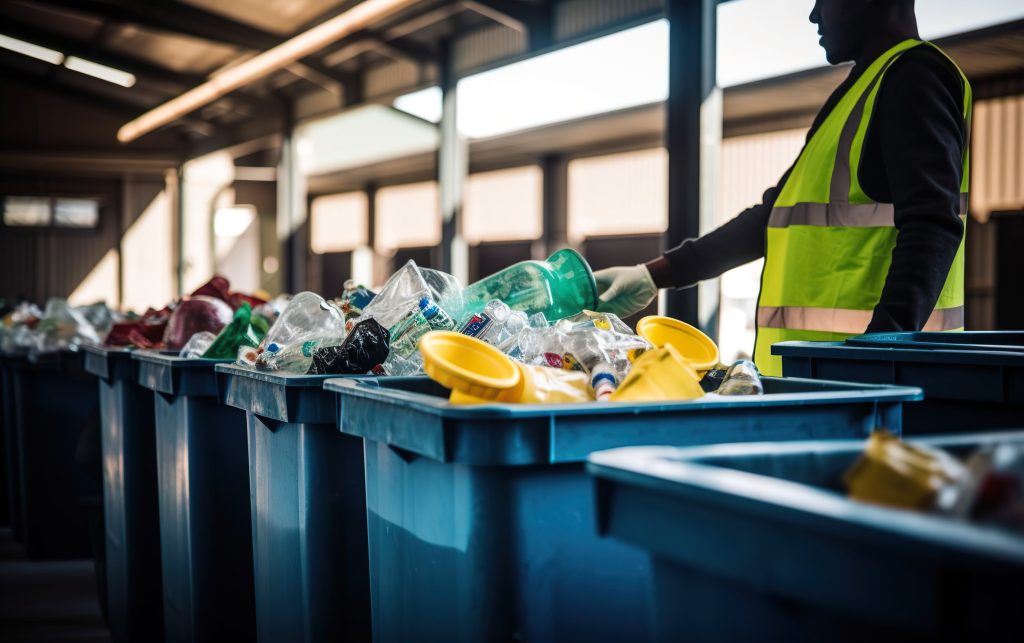2024 Year In Review: Reflecting on the Past Year as we Enter a Crucial Time for Plastics Recycling
2025 is a pivotal year for plastics recycling. While major initiatives and commitments focused on improving recycling and creating a circular economy for plastics have designated this year as a key milestone to meet sustainability goals, some companies are stepping back from those commitments.
Policies to improve recycling are being introduced or going into effect, yet the oversupply of virgin plastic threatens to undercut recycling as widespread misinformation and attacks on the efficacy of recycling continue.

The Association of Plastic Recyclers (APR) faces these challenges head-on and focuses on the momentum we have built over the past 30 years through celebrating milestones, exceeding expectations, and continued progress.
As we look back at 2024, we take pride in our accomplishments and look ahead to the challenges and opportunities that will drive the growth and improvement of recycling for plastics.
Robust Policies to Accelerate Plastics Recycling
Strong public policies are essential to drive the transition to a circular economy for plastics. We need comprehensive strategies that align and maximize every step of the recycling system from product design to collection to processing to remanufacturing. While recycling offers environmental benefits, it’s also a business. Effective public policies can help create the right economic conditions to increase plastic collection and improve recycling, making recycled plastics the foundation of our circular economy.
APR engages across the states driving significant new legislation to increase plastic recycling rates, improve quality, and expand PCR markets, while also advocating and advising for effective implementation of new laws. APR is a trusted technical expert and resource for federal legislators and agencies on plastics recycling, and we also work to ensure APR tools are utilized as regional and global standards. 2024 brought a wide variety of highlights as we work towards achieving our policy goals.

- Direct Advocacy and Impact: We directly advocated in five states, submitting 19 letters and delivering in-person testimony to influence policy decisions. We also supported the United Nations negotiations toward a global plastics treaty with staff on the ground for the Ottawa events, direct meetings and technical support for US negotiators, and as members of the Business Coalition for a Global Plastics Treaty.
- EPR for Packaging Expansion: Our efforts supported the passage of EPR for packaging in Minnesota, the fifth US state to adopt this critical policy, and the approval of packaging EPR targets in Colorado.
- Shaping EPR Implementation: We provided crucial feedback on EPR implementation in Oregon, Colorado, and California, submitting over 65 pages of public comments to prioritize recycled content demand and market development, and to limit burden on recyclers.
- Thought Leadership: We delivered over 20 presentations to prestigious bodies like the US National Academies of Science and the World Trade Organization, shaping state, national, and global policy direction.
- Technical Expertise at the National Level: We provided formal recommendations to national programs through letters to the US Department of Energy, US General Services Administration, US Congressional offices, and Canadian government bodies.
- Empowering Members: We expanded member resources through regular policy updates, webinars, newsletters, and a new policy hub with interactive maps and key policy information.
Celebrating 30 Years of the APR Design® Guide
This year marks the 30th anniversary of the APR Design® Guide for Plastics Recyclability, a milestone that underscores how critical design is to the success of plastics recycling. Since its inception, the APR Design® Guide has become widely recognized across the globe as the authority on plastics packaging design for recyclability, helping companies measure each aspect of a package design against industry-accepted criteria to ensure that it is truly compatible with the recycling system. The APR is pleased to see the number of companies that understand design for recyclability is essential to achieving sustainability goals and a circular economy for plastics grow every year. As we commemorate three decades of the APR Design® Guide, we have continued to see progress and growth over the past year.
- We launched the new and improved APR Design® Guide for Plastics Recyclability Digital Tool introducing an enhanced user experience with new capabilities and features to expand the reach and impact of this critical tool.
- In 2024 alone, 138 products received APR Design® Recognition, which provides third-party validation that a package or packaging component’s design is compatible with the North American recycling system
- The number of companies that have completed APR Design® Training continues to grow, many of which have added it to their annual learning plan and repeat it annually. APR held a successful regional Training and Tours session in Fall 2024, with a Flexibles Design Training and Tour planned for April 2025.
- Nominations for the inaugural APR Recycling Leadership Awards were opened in 2024 to recognize those who are improving recycling for plastics. Winners were announced during the 2025 Plastics Recycling Conference (PRC), where recipients gained industry recognition and the opportunity to showcase their work.
- Working towards global alignment of Design for Recyclability Guidance, collaboration with RecyClass, and other organizations, continued in 2024. The French translation of the APR Design® Guide was published with Spanish and Mandarin translations to come in 2025.
- The APR PCR Certification Program grew to include 39 Certified Recyclers and 49 Certified Locations. Our new Reclaimer Standard was published in 2024 which is based on ISO 22095, 17065, and 17067. It was coordinated with the RecyClass Recycling Process Certification Standard and is written with current EPR Legislations in mind.

Correcting the Record on Plastics Recycling
Plastic waste is a major environmental challenge that requires bold, comprehensive solutions including reduction, reuse, and recycling. We know that recycling works. While it remains an important part of the system to build a more sustainable world, the battle against misinformation continues. APR remains focused on the benefits of recycling and developing resources, programs, and tools to improve and support the system. APR launched a new and improved website with a wide variety of informational resources and tools to help correct the record on plastics recycling at your fingertips.
- Learn how the recycling process works within a larger system of solutions to tackle plastic waste, protect the environment, strengthen the economy, and build a more sustainable world in How Recycling Works.
- Explore a compilation of research papers and resources from academic institutions on the topic of plastics recycling in the Academic Library.
- Read about the latest issues, trends, announcements, and more in the world of plastics recycling in the APR blog. The most highly read blog of the past year was Recycling More and Using Less On Earth Day 2024.
- Learn about the latest issues, new ideas, trends, and opportunities for recycling on APR’s Recycled Content Podcast. Episode 34, Correcting the Record on Plastic Recycling, was the most downloaded of the year.
- Explore ALL of these resources and more with the ability to filter by category and content type on the APR Informational Resources Landing Page.

- Check out APR’s latest announcements on LinkedIn where we have now surpassed 27,000 followers.
The Association of Plastic Recyclers is Committed to Improving Recycling for Plastics
Achieving a circular economy for plastics is within reach. It will require collaboration across the value chain, vision, and commitment. The APR Team looks forward to working with our members to make 2025 a transformative year for plastics recycling.